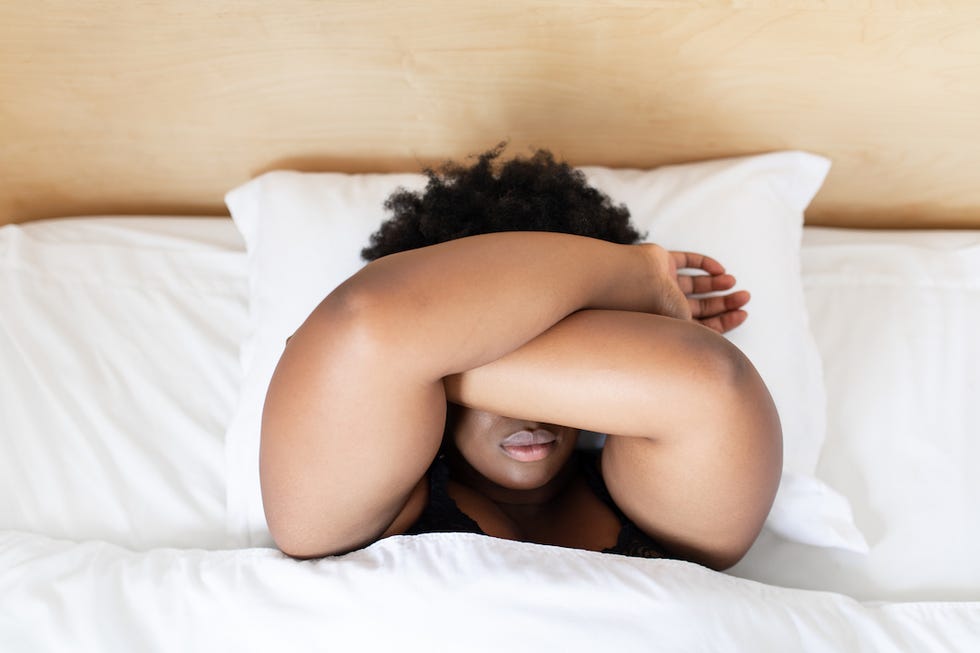
Audio By Carbonatix
Painful sex is all too common but it remains a taboo subject and something an alarming number of us struggle through silently. It's the worst. Because sex is supposed to be fun, right? Plus, if it's affecting you, it can be a real challenge to figure out why sex might be painful for you.
Shame, medical gaslighting, misdiagnosis, having no idea bout symptoms and what they mean - it's a minefield. But we spoke to some experts to help understand common conditions and close the orgasm gap. So if you've ever had painful sex, read on.
Why is sex painful?
"While we are not taught about our bodies, we are taught to feel ashamed of them." says Sylvia Kang of Mira Fertility. "Many women feel shame about their bodies’ normal functions, periods, hormones and sex lives. Even as adults, these conversations are difficult. This lack of education translates into healthcare as well."
You've probably never heard of it, but anywhere from 4 to 28 per cent of women 20 to 40 suffer from a condition called vestibulodynia. The condition makes any sort of vaginal penetration so painful, women who have it find having sex difficult, or in some cases, impossible.
Vestibulodynia is one of two types of vulvodynia, which is severe, unidentifiable pain surrounding the vagina. Vestibulodynia is distinguished by pain that's limited to the area surrounding the opening of the vagina, or the "vestibule" (side note: the vestibule of a vagina? Like, my vagina has a foyer? Medical language is wild).
If you have the condition, pain can be caused by penetration during sex, putting in a tampon, or even jeans that are too tight and put pressure on the area. People with generalised vulvodynia might also experience almost constant pain, pain that can be brought on spontaneously, and the painful area is less localised.
Previously known as vulvar vestibulitis, the condition is characterised by intense burning sensations at the entry to the vagina. Though researchers still haven't identified a singular cause, some theorised causes include injury to the vulval nerves, localised hypersensitivity to yeast infections, and pelvic floor muscle weakness, which can be caused by anything from giving birth to injuries to menopause and pelvic organ prolapse.
"I've always had pain during sex, ever since the first time," a 23-year-old woman says. Her comments form part of a small study carried out by researchers in Oslo. "It destroys your sex life in a way. He thinks ʻall I've done is to inflict pain on her.' So it's not something you want to tell your boyfriend."
One woman from the study said she'd broken up with a boyfriend because the pressure to have sex she couldn't physically enjoy was too intense. Another had been with her husband for 12 years, but they hadn't ever had sex.

Vaginismus vs. Vulvodynia
This condition is similar to another condition called vaginismus. This is an involuntary tightness of the vagina and its muscles, which usually occurs during sex or a pelvic exam. It's a psychosexual condition and often a reaction to sexual assault or rape, but not always.
Singer Meghan Trainor recently shared details of her sex life with her husband and her struggles with the condition. "I thought that every woman walking around was always in pain during and after sex. My pussy is broken, though. I have pussy anxiety." she said.
With vaginismus, tightening the muscles of the vagina is an involuntary response but it's also something that can be treated.
In fact, Vaginismus Awareness reports that there's a 95% success rate for treatment for the condition. Treatments range from physiotherapy and progressive desensitisation using dilators and vibration, to psychosexual therapy and CBT and relaxation techniques that include breath work and self-massage.
Using a wand vibrator or a bullet vibrator - both external-only sex toys for clitoral stimulation can help with relaxing your pelvic muscles and getting you off in a safe and healthy way - and can make sex with a partner way more enjoyable if you're struggling with pain.

Fibromyalgia
Fibromyalgia is a chronic condition that can cause fatigue and pain throughout the body. It affects around seven times as many women as men, which speaks to the stress women carry day to day. The exact cause of the condition is unknown but it is thought that it is often triggered by an emotional or physically stressful event.
The majority of women will often see symptoms develop between the ages of 30 and 50 and Fibromyalgia often peaks in women during the reproductive years, leading many to believe that female hormones play a role in higher incidences and severity of the disorder.
Symptoms can include chronic pain across the body, extreme sensitivity, fatigue, poor sleep quality, headaches and IBS (irritable bowel syndrome). Symptoms may also feel worse in women who are postmenopausal or experiencing menopause with increased feelings of crankiness, soreness or anxiety and of course, painful sex.
"One of the key myths is that some believe it isn’t a condition whatsoever, due to the fact pain is subjective." says Dr Anushka Patchava, Deputy Chief Medical Officer at Vitality. "This belief can be damaging and trivialises the symptoms of those suffering with the condition. Although there isn’t a simple cure for Fibromyalgia, a GP will be able to rule out any other conditions and discuss the best treatment that can help ease symptoms."

Endometriosis and sex
One of the main causes of painful sex is a condition called endometriosis. Endometriosis symptoms can be gruelling and as a result, sexual shame is a quiet truth of having endo.
A condition where tissue similar to the lining of the womb starts to grow in places like the ovaries and fallopian tubes, endometriosis is now a huge talking point in women's health and celebrities like Molly-Mae Hague and Halsey have bravely spoken out about their experiences with endo.
Similarly to Fibromyalgia, the challenge with spotting the symptoms of endometriosis is that they often overlap with other conditions or will be dismissed by those affected. The symptoms include fatigue, debilitating period pain, bladder issues and of course, pain during sex. For some people with the condition, despite the fact that it's being more widely discussed, it can take seven years to receive a diagnosis.
"Over 50% of women with PCOS go undiagnosed, and many women receive the catch-all diagnosis rather than getting the care they need" says Sylvia Kang. This is why it's vital to know what the symptoms are, and if you're having painful sex, push for answers from your doctor.
How to deal with painful sex
Living with medical conditions like these is a common experience for women everywhere, which is why talking about them, pushing for diagnoses and new treatments and being upfront with your partner about your pain all really matter.
In a 2021 survey of 1,000 women, Mira found that 68% of women said they had to “prove” their symptoms to their healthcare provider.
"Mix in poor education, embarrassment disclosing common hormonal issues like hair loss, chronic pelvic pain, gastrointestinal issues, and changing sex drive, and poor medical outcomes from the part of doctors, it makes sense that women from all walks of life struggle to enjoy a healthy sex life and get the care and attention they need." says Sylvia Kong.
“Increasing awareness around common health conditions that affect women like endometriosis and fibromyalgia can help to break down barriers to seeking treatment or support and give women more confidence to discuss concerns with their GP or trusted friends or family." says Dr Anushka Patchava.
"The symptoms of many of these conditions can have a huge impact on people’s daily lives, causing pain and discomfort and even impacting their emotional and physical wellbeing. By increasing conversations about women’s health concerns and dispelling common myths, we can help to familiarise the public with these conditions and provide better support to those who are affected.”
It's important to remember that what actually counts as sex is whatever you decide and whatever you feel comfortable with. If you're in pain, never push yourself to have P in V sex. Stop, slow down and focus on solutions to make intimacy more enjoyable for you. If your partner cares about you, they should be willing to listen and work out how to navigate sex and intimacy as a team, focusing on your experience just as much as theirs.
Latest Stories
-
Political parties must stay out of local governance – Andrew Bediako
9 seconds -
Beyond Witchcraft: Why preparation, not spiritual fear, determines success
1 minute -
Margaret Korme Tetteh
39 minutes -
Sammy Gyamfi’s work at Goldbod in few months would take someone five years – Ato Forson
54 minutes -
From Accra to Wuzhen: The Ghanaian schoolgirls making their mark in global AI
56 minutes -
Ghana must prioritise value addition to sustain IMF gains – Prof Asuming
1 hour -
Man allegedly poisons his incoming girlfriend over GH₵100 at Buduburam
1 hour -
Jennifer Frimpong: Ghana’s health system faces funding shock, urgent reforms needed
1 hour -
Tighter cocoa supply lifts prices as Ghana records good crop conditions
2 hours -
KAAF University donates to Widows, urges Public to end Discrimination against Elderly Widows
2 hours -
NAIMOS task force disrupts illegal mining operations along Ankobra River
2 hours -
President’s New Year message lacked hope and sincerity – NPP’s Senyo Amekplenu
3 hours -
Ebo Noah remanded pending psychiatric exam, to reappear on January 15
3 hours -
Our public university system is falling down
3 hours -
Ho Central Mosque under heavy security, worshippers forced to pray outdoors
4 hours

